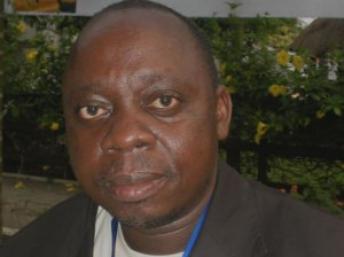
Human rights defender's story: Dolly Ibefo Mbunga from the Democratic Republic of the Congo
Dolly Ibefo Mbunga, leading La Voix des Sans Voix in the DRC, navigates significant risks to defend human rights, facing government reprisals and fostering international dialogues for protection.
Prominent human rights defender and Executive Director of La Voix des Sans Voix (the Voice of the Voiceless) Dolly Ibefo Mbunga, reflects on the situation for human rights defenders in the Democratic Republic of the Congo (DRC) and the on-going and significant threat of reprisals. The conversation with ISHR took place at the regional consultations in Abidjan, Côte d’Ivoire, which were facilitated by the office of the African Commission’s Special Rapporteur on Human Rights Defenders, the Côte d’Ivoire Human Rights Defenders Network and the East and Horn of Africa Human Rights Defender Project and ISHR.
Dolly first became active in human rights work when he was a student, at a time when there was only one political party in the DRC. He began his work by providing support to people in difficult situations, such as when they came into conflict with government officials.
It was in 1987 that he became involved in La Voix des Sans Voix, of which he is now the Executive Director, and there was no looking back. He was at a political party meeting, when it was suddenly broken up by the authorities and everyone was forced to flee the violence. After taking flight, Dolly sought refuge in a secret hideaway, where he met Floribert Chebeya the former leader of La Voix des Sans Voix.
‘After meeting Floribert I became strongly involved in La Voix des Sans Voix. I felt that I was, and still am, called to be a voice of the voiceless. I honestly believe that we are needed to do exactly what our organisation says. We are the voice of the voiceless.’
As is true for many activists, defending the voiceless brings substantial risks and often carries a high price. In 2010 Chebeya was found dead in his car. He had been called to a meeting with the national police chief, which never take place.
Voix des Sans Voix works to support human rights defenders in the DRC; monitoring the situation of human rights defenders and providing support and capacity building to human rights organisations. They also actively engage and interact with the United Nations and African Human Rights Commission in situations where human rights defenders suffer reprisals, and make statements to the Human Rights Council.
‘Interacting with these human rights systems often creates a reaction. Even just the fact that we receive a response from the relevant mechanism, in itself, gives us strength to continue our work supporting human right defenders’
As a human rights activist for the past 30 years, Dolly has witnessed first-hand a change in situation for human rights defenders in the DRC.
‘Between 1996 and 1999, ‘human rights’ was not a known concept in the DRC, nor was it acceptable to talk out against the ruling party.’
This meant that, out of fear, no one wanted to speak negatively about the existing regime.
In speaking of the past, Dolly recalls the troubled circumstances surrounding the assassination of Floribert Chebeya. During this period, La Voix des Sans Voix and its employees were continually receiving threats from the Government.
Since then, he notes, the actions of the Government in DRC have changed. They no longer receive direct threats, but are invited to ‘so called’ meetings with the Government, which can result in a person disappearing.
‘Whenever we feel like there is a severe security risk we avoid being out late at night and go into hiding. Just recently I was advised not to attend a demonstration, as I was on a list of people that were going to be targeted at the demonstration’.
He explains that the challenges he currently faces are various and many. He has been arrested on numerous occasions.
‘You are arrested for allegedly supporting criminals.’
These ‘criminals’ are individuals who are politically active or who have made a public statement against the Government.
‘Each time you are arrested you are taken to court and put before a judge. This means that whether you are charged or not completely depends on the judge presiding over your case.’
Another challenge for La Voix des Sans Voix is gaining access to funds. Given the size of the DRC and the time it takes to travel from one province to another, assisting human rights defenders and human rights organisations across the entire country is in itself a challenge. Dolly expresses his sincere appreciation for the funding La Voix des Sans Voix receives, which enables him and his colleagues to continue their work.
